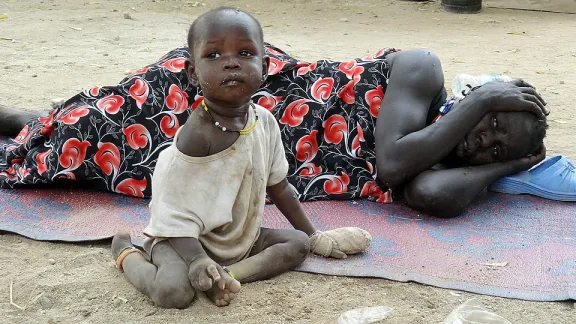
A child wounded in the fighting rests at Juba hospital, where the LWF is providing blankets, food and water. © LWF
More Help Needed to Prevent Humanitarian Disaster
Humanitarian organizations, including The Lutheran World Federation (LWF), have added emergency aid programs to their ongoing work in South Sudan in response to inter-ethnic fighting there.
Since December, cattle raids in Jonglei State have become increasingly violent and prolific. On 13 January, according to a local Member of Parliament at least 55 people were reported to have died, 52 were injured and 40 children were abducted in Wek and Patuet districts.
Three days later 80 people were reportedly killed and 300 houses burnt in Duk Padiet in Duk County. To prevent further attacks a heavier police or military presence is essential, officials say.
Until now, the LWF Department for World Service community development work in Jonglei included peace-building campaigns targeting youth living in the cattle camps.
Non-government organizations, including the LWF and other members of the ACT Alliance, have conducted initial assessments in many parts of the state where the violence has occurred. Food and other forms of emergency assistance are being provided to many of the affected areas, despite the constant threat of insecurity in the central part of the state.
The aid organizations report that 7,317 vulnerable people among the 16,260 people who have registered for humanitarian assistance in Duk Padiet have received food rations. Thirty people have been air lifted to Juba and Bor for medical support.
In Pibor, over 200km northeast of Juba, 16 humanitarian organizations are on the ground providing assistance. Food distribution is ongoing and over 29,000 people been provided with 15 days worth of food thus far.
All people registered in Pibor have access to medical assistance, while clean drinking water and latrines are under construction. Severe acute malnutrition is also being addressed and over 2,000 children have been included in a supplementary feeding program.
The majority of those who fled the fighting in other towns, such as Likuangole, Boma and Gumuruk, have also received emergency food rations, but other basic needs, such as water, hygiene and non-food items, are still desperately needed.
The LWF is leading the response by the partners of the ACT Alliance with a presence in Juba. Together, the organizations are focusing on reaching those not yet served by other humanitarian agencies. The LWF is providing 2,000 non-food item kits to Pibor and a further 2,300 kits have been sent to Bor and Panyagor.
In one town, seven boreholes out of 10 are in need of repair and the LWF is sending a water and sanitation expert to determine what needs to be done to get the water flowing again.
Critical during emergencies of this type is the prevention of diseases like cholera and other gastro-intestinal illnesses that cause diarrhea, and the LWF is providing soap and building latrines to prevent disease. Health teams are also on the ground to screen people and refer the sick for treatment.
Currently close to 2,000 health kits are being sent to locations within Jonglei where those affected by the violence have fled. Over 600 hygiene kits have also been distributed to these areas.
Some of the affected areas south of Pibor have not yet been reached due to difficulty of access. In addition, logistic challenges, including a shortage of transportation, are hindering response efforts. Emergency shelter also remains a key need of those affected by the attacks, as the town was badly burned during the violence. (575 words)
(Written for LWI by Melany Markham in Juba, South Sudan)


